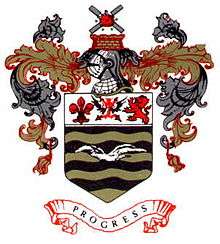Please tell us which country and city you'd like to see the weather in.

Blackpool Borough
Blackpool Borough was a rugby league club based in Blackpool, Lancashire, England, that played in the Rugby Football League from 1954 until 1993. The club moved to Wigan in 1987 and was renamed Springfield Borough; to Chorley in 1988 and was renamed Chorley Borough; to Altrincham in 1989 and was renamed Trafford Borough, and finally back to Blackpool in 1992 as Blackpool Gladiators. It folded in 1997.
The team wore tangerine, black and white jerseys.
History
Blackpool Borough
A Blackpool club were members of the Northern Union Lancashire Second Competition in 1898–99. The first unsuccessful application for a Blackpool team to join the Rugby League was made in December 1950. Blackpool Borough were accepted into the Rugby League for the 1954–55 season. In their early days, they were known as "the Babes". The first ever victory was over Hull Kingston Rovers at Blackpool.
Borough played at Blackpool's St Anne's Road Greyhound Stadium but larger fixtures were played at Blackpool FC's Bloomfield Road Stadium. Their record attendance was 12,015 on 10 September 1955 when they drew with the New Zealand tourists 24–24 at Bloomfield Road. The record attendance was set in 1957 at 22,000 for the third round Challenge Cup match against Leigh.

Blackpool
Blackpool ![]() i/ˈblækpuːl/ is a seaside resort in Lancashire, England, on England's northwest coast. The town is on the Irish Sea, between the Ribble and Wyre estuaries, 17.5 miles (28.2 km) northwest of Preston, 27 miles (43 km) north of Liverpool, 30 miles (48 km) northwest of Bolton and 40 miles (64 km) northwest of Manchester. It had an estimated population of 142,065 at the 2011 Census.
i/ˈblækpuːl/ is a seaside resort in Lancashire, England, on England's northwest coast. The town is on the Irish Sea, between the Ribble and Wyre estuaries, 17.5 miles (28.2 km) northwest of Preston, 27 miles (43 km) north of Liverpool, 30 miles (48 km) northwest of Bolton and 40 miles (64 km) northwest of Manchester. It had an estimated population of 142,065 at the 2011 Census.
Throughout the Middle Ages and Early Modern period, Blackpool was a coastal hamlet in Lancashire's Hundred of Amounderness, and remained such until the mid-18th century when it became fashionable in England to travel to the coast in the summer to bathe in sea water to improve well-being. In 1781, visitors attracted to Blackpool's 7-mile (11 km) sandy beach were able to use a new private road, built by Thomas Clifton and Sir Henry Hoghton. Stagecoaches began running to Blackpool from Manchester in the same year, and from Halifax in 1782. In the early 19th century, Henry Banks and his son-in-law John Cocker erected new buildings in Blackpool such that its population grew from less than 500 in 1801 to over 2,500 in 1851. St John's Church in Blackpool was consecrated in 1821.

Blackpool (UK Parliament constituency)
Blackpool was a parliamentary constituency centred on the town of Blackpool in Lancashire. It returned one Member of Parliament to the House of Commons of the Parliament of the United Kingdom.
The constituency was created for the 1885 general election, and abolished for the 1945 general election, when it was replaced by the new Blackpool North and Blackpool South constituencies.
Members of Parliament
Election results
Elections in the 1910s
Elections in the 1920s
Elections in the 1930s
Elections in the 1940s
General Election 1939/40: Another General Election was required to take place before the end of 1940. The political parties had been making preparations for an election to take place from 1939 and by the end of this year, the following candidates had been selected; *Conservative: Roland Robinson
References

Blackpool (TV serial)
Blackpool is a British television musical comedy drama serial, produced in-house by the BBC. It was screened on BBC One as six one-hour episodes on Thursday nights at 9pm from 11 November to 16 December 2004. When retransmitted by BBC America in 2005, it was renamed Viva Blackpool, and went on to win a Peabody Award for BBC Worldwide, the commercial overseas distribution subsidiary of the BBC. A sequel in the form of a TV movie was produced by the BBC, also called Viva Blackpool in the UK (2006).
Plot
The plot concerns the murder of a young man in a Blackpool arcade, and how it affects the people involved in the arcade and the investigation:
Radio Stations - Blackpool
SEARCH FOR RADIOS
Podcasts:

Latest News for: blackpool borough
Blackpool’s Luke Marwood’s voice heard in UK Youth Parliament (Blackpool Borough Council)
Blackpool’s Grundy Art Gallery announces spring programme launch (Blackpool Borough Council)
New road safety signs to keep Blackpool schoolchildren safe (Blackpool Borough Council)
Blackpool highlights investment opportunities at major international property conference (Blackpool Borough Council)
Development land to be released at Enterprise Zone (Blackpool Borough Council)
- 1
